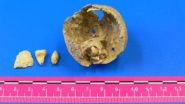(Press-News.org) ANN ARBOR, Mich. — University of Michigan research sheds new light on why certain people are more likely to suffer from rheumatoid arthritis – paving the way to explore new treatments for both arthritis and other autoimmune diseases.
The new UMHS research in mice identifies how a specific group of genes works behind the scenes to activate the bone-destroying cells that cause severe rheumatoid arthritis, a debilitating health issue for millions of Americans.
"We believe this could be a significant breakthrough in our understanding of why certain genes are associated with higher risk of rheumatoid arthritis and other autoimmune diseases – a link that has been a mystery in the field for decades," says lead author Joseph Holoshitz, M.D., professor of internal medicine and associate chief of research in the division of rheumatology at the U-M School of Medicine.
"We hope that this improved understanding will open the door to future design of drugs to treat this crippling disease and autoimmune disease in general."
The research appeared in The Journal of Immunology and was highlighted by Nature Reviews Rheumatology.
Rheumatoid arthritis is a chronic inflammatory disorder that damages the lining of joints and causes bone erosion, joint deformity and disability. The disease is an autoimmune disorder, characterized by the body's immune system mistakenly attacking the body's tissues.
Researchers have long studied the phenomenon of why certain versions of an inherited group of genes known as "human leukocyte antigen" (HLA) are associated with autoimmune disorders. One subset of these HLA genes that codes a protein sequence called "shared epitope" represents the most significant genetic risk factor for rheumatoid arthritis, affecting disease susceptibility and severity. However, until now, the reason for this strong link has been unclear.
A common theory in the field has been that the association between particular HLA genes and autoimmune diseases is a result of mistakenly identifying body tissues as foreign – making the body the target of the immune system and setting off an attack on self-tissues, which results in disease.
The UMHS research challenges this long-held theory. The study shows, for the first time, how this subset of HLA genes causes arthritis – by activating inflammation-causing cells, as well as bone-destroying cells (known as osteoclasts). This leads to severe arthritis and bone erosion.
"We showed how the shared epitope is directly triggering osteoclasts, the very cells that are responsible for joint destruction in people with the disease," says Holoshitz.
"Understanding these mechanisms at play could be a significant piece of future drug development. Because we now know the molecular mechanism that activates arthritis-causing cells, we have the potential to block that pathway with simple chemical compounds that could be used to treat rheumatoid arthritis and other diseases."
INFORMATION:
Additional Authors: Ying Liu, Jiaqi Fu, Ph.D., Song Ling, Ph.D., Alessandro Colletta, and Prannda Sharma, Department of Internal Medicine, U-M School of Medicine; Dana Begun, Ph.D., and Steven Goldstein, Ph.D. Department of Orthopedic Surgery, U-M School of Medicine; Jeena Joseph, Ph.D. and Russell Taichman, D.D.S., Ph.D., Department of Periodontics and Oral Medicine, U-M School of Dentistry
Funding: National Institutes of Health grant numbers: GM088560, AR059085, AR056786, AR55170, American College of Rheumatology, and a Johnson & Johnson Diversity Support Grant
Disclosure: None
Reference: The Journal of Immunology, Jan.3, doi:10.4049/jimmunol.1202150
Researchers uncover gene's role in rheumatoid arthritis, findings pave way for new treatments
U-M findings reveal how certain genes activate cells that cause rheumatoid arthritis in mice; discovery may extend to other autoimmune diseases
2013-01-24
ELSE PRESS RELEASES FROM THIS DATE:
Climate change beliefs of independent voters shift with the weather, UNH study finds
2013-01-24
DURHAM, N.H. – There's a well-known saying in New England that if you don't like the weather here, wait a minute. When it comes to independent voters, those weather changes can just as quickly shift beliefs about climate change.
New research from the University of New Hampshire finds that the climate change beliefs of independent voters are dramatically swayed by short-term weather conditions. The research was conducted by Lawrence Hamilton, professor of sociology and senior fellow at the Carsey Institute, and Mary Stampone, assistant professor of geography and the New ...
Ovarian tumor, with teeth and a bone fragment inside, found in a Roman-age skeleton
2013-01-24
A team of researchers led by the UAB has found the first ancient remains of a calcified ovarian teratoma, in the pelvis of the skeleton of a woman from the Roman era. The find confirms the presence in antiquity of this type of tumour - formed by the remains of tissues or organs, which are difficult to locate during the examination of ancient remains. Inside the small round mass, four teeth and a small piece of bone were found.
Teratomas are usually benign and contain remains of organic material, such as hair, teeth, bones and other tissues. There are no references in the ...
Medical cannabis provides dramatic relief for sufferers of chronic ailments
2013-01-24
Though controversial, medical cannabis has been gaining ground as a valid therapy, offering relief to suffers of diseases such as cancer, Post-Traumatic Stress Disorder, ALS and more. The substance is known to soothe severe pain, increase the appetite, and ease insomnia where other common medications fail.
In 2009, Zach Klein, a graduate of Tel Aviv University's Department of Film and Television Studies, directed the documentary Prescribed Grass. Through the process, he developed an interest in the scientific research behind medical marijuana, and now, as a specialist ...
Cancer expert remains to be convinced by breast screening review
2013-01-24
Michael Baum, Professor emeritus of surgery at University College London says that, while deaths from breast cancer may be avoided, any benefit will be more than outweighed by deaths due to the long term adverse effects of treatment.
He estimates that, for every 10, 000 women invited for screening, three to four breast cancer deaths are avoided at the cost of 2.72 to 9.25 deaths from the long term toxicity of radiotherapy.
These figures contrast with an independent report on breast cancer screening, led by Sir Michael Marmot and published in November last year. Marmot ...
Tracking the spread of dengue fever: Domestic networks drive rapid transmission of human infection
2013-01-24
The mosquitoes that spread dengue fever tap into the domestic networks of humans, along with their bloodstreams, finds a study recently published in the Proceedings of the National Academy of Sciences (PNAS).
The data from Iquitos, Peru, shows that the trail of the most rapid transmission of human infections does not lead through large, public gathering places, as might be expected, but from house-to-house, as people visit nearby friends and relatives.
"It's common in a dengue fever outbreak to first treat public places like schools for mosquitoes, but our results show ...
New, cost-cutting approach to formulating pest-killing fungi
2013-01-24
This press release is available in Spanish.
Biopesticides containing beneficial fungi are often grown on grains or other solids, but U.S. Department of Agriculture (USDA) scientists have shown a liquid diet can work better.
The approach, dubbed "liquid culture fermentation," offers several benefits, including lower material costs and increased yields of certain forms of insect-killing fungi, including Isaria or Metarhizium, which can serve as biobased alternatives to synthetic pesticides.
For decades, biopesticide makers have grown such fungi on moistened grains ...
The 3D fireworks of a star
2013-01-24
In 1901 the star GK Persei gave off a powerful explosion that has not stopped growing and astonishing ever since. Now a team of Spanish and Estonian astronomers has reconstructed the journey of the emitted gas in 3D which, contrary to predictions, has hardly slowed down its speed of up to 1,000 km/s after all this time.
Thanks to the images captured from the Isaac Newton Telescope and the Nordic Optical Telescope in La Palma (Canary Islands, Spain), a European team of astronomers has constructed a three dimensional map of the remnant of a nova, or in other words, what ...
'Connection error' in the brains of anorexics
2013-01-24
RUB researchers find altered connectivity in the brain network for body perception.
The weaker the connection, the greater the misjudgement of body shape
When people see pictures of bodies, a whole range of brain regions are active. This network is altered in women with anorexia nervosa. In a functional magnetic resonance imaging study, two regions that are important for the processing of body images were functionally more weakly connected in anorexic women than in healthy women. The stronger this "connection error" was, the more overweight the respondents considered ...
Researchers prevent cancer spread by blocking tissue scarring
2013-01-24
What to fear most if faced by a cancer diagnosis is the spread of the cancer to other parts of the body. This process called metastasis accounts for over 90% of cancer patient deaths and therefore is a strong focus for cancer researchers. Researchers at BRIC, University of Copenhagen have shown that the enzyme Lysyl Oxidase (LOX) can create a "scarred" microenvironment that enhances cancer spreading. By blocking activity of the LOX enzyme, the researchers succeeded in significantly decreasing metastasis in a model of breast cancer.
'When we inhibit the activity of LOX ...
Synthetic corkscrew peptide kills antibiotic-resistant Gram-negative bacteria
2013-01-24
HOUSTON – An engineered peptide provides a new prototype for killing an entire category of resistant bacteria by shredding and dissolving their double-layered membranes, which are thought to protect those microbes from antibiotics.
The synthetic peptide was effective in lab experiments against antibiotic-resistant Gram-negative bacteria, which cause a variety of difficult-to-treat, potentially lethal infections such as pneumonia and sepsis.
The team led by scientists at The University of Texas MD Anderson Cancer Center reported its findings online in advance of print ...
LAST 30 PRESS RELEASES:
Breaking the efficiency barrier: Researchers propose multi-stage solar system to harness the full spectrum
A new name, a new beginning: Building a green energy future together
From algorithms to atoms: How artificial intelligence is accelerating the discovery of next-generation energy materials
Loneliness linked to fear of embarrassment: teen research
New MOH–NUS Fellowship launched to strengthen everyday ethics in Singapore’s healthcare sector
Sungkyunkwan University researchers develop next-generation transparent electrode without rare metal indium
What's going on inside quantum computers?: New method simplifies process tomography
This ancient plant-eater had a twisted jaw and sideways-facing teeth
Jackdaw chicks listen to adults to learn about predators
Toxic algal bloom has taken a heavy toll on mental health
Beyond silicon: SKKU team presents Indium Selenide roadmap for ultra-low-power AI and quantum computing
Sugar comforts newborn babies during painful procedures
Pollen exposure linked to poorer exam results taken at the end of secondary school
7 hours 18 mins may be optimal sleep length for avoiding type 2 diabetes precursor
Around 6 deaths a year linked to clubbing in the UK
Children’s development set back years by Covid lockdowns, study reveals
Four decades of data give unique insight into the Sun’s inner life
Urban trees can absorb more CO₂ than cars emit during summer
Fund for Science and Technology awards $15 million to Scripps Oceanography
New NIH grant advances Lupus protein research
New farm-scale biochar system could cut agricultural emissions by 75 percent while removing carbon from the atmosphere
From herbal waste to high performance clean water material: Turning traditional medicine residues into powerful biochar
New sulfur-iron biochar shows powerful ability to lock up arsenic and cadmium in contaminated soils
AI-driven chart review accurately identifies potential rare disease trial participants in new study
Paleontologist Stephen Chester and colleagues reveal new clues about early primate evolution
UF research finds a gentler way to treat aggressive gum disease
Strong alcohol policy could reduce cancer in Canada
Air pollution from wildfires linked to higher rate of stroke
Tiny flows, big insights: microfluidics system boosts super-resolution microscopy
Pennington Biomedical researcher publishes editorial in leading American Heart Association journal
[Press-News.org] Researchers uncover gene's role in rheumatoid arthritis, findings pave way for new treatmentsU-M findings reveal how certain genes activate cells that cause rheumatoid arthritis in mice; discovery may extend to other autoimmune diseases


